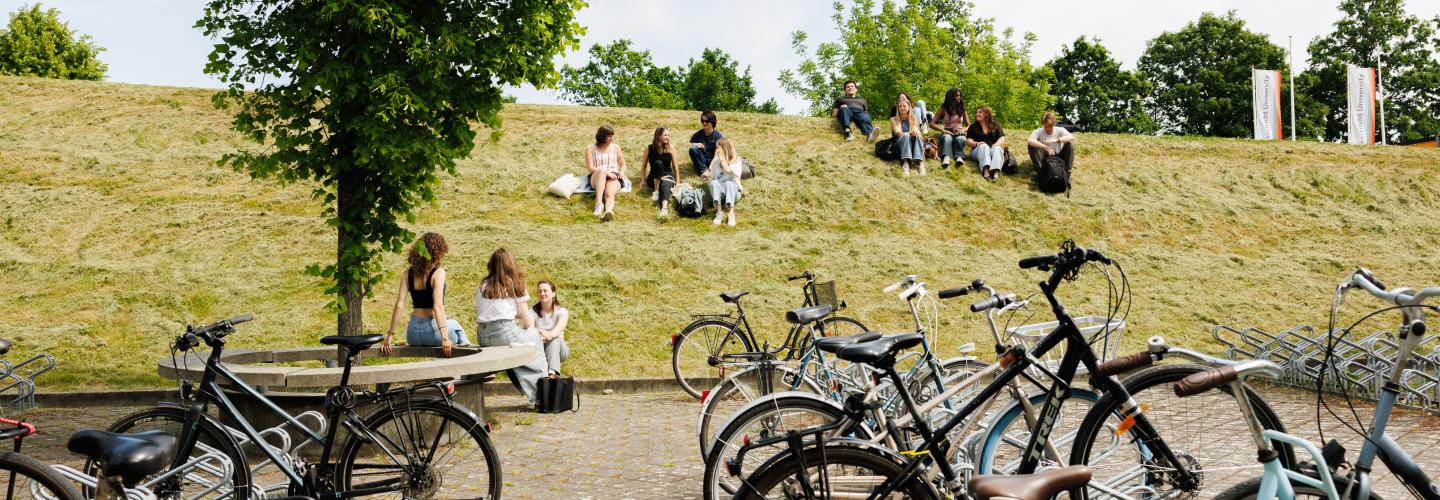Why this programme
Our world is facing serious problems such as climate change and increasing poverty and inequality. Ensuring health and well-being is complex, which makes promoting them fundamental. The starting point to promote health is human behaviour and the environments in which that behaviour occurs. In this programme, we focus on understanding and changing behaviours that contribute to health and well-being. Health education enables people to increase control over and improve their health by, for example, developing skills and capabilities. Health promotion ensures that environments, communities, and policies are beneficial to health and well-being.
You are equipped with important tools for understanding human behaviour and leveraging a comprehensive planned and systematic approach to the development, implementation and evaluation of health-promoting interventions.
This programme is for you if:
- you have a keen interest in understanding (un)healthy behaviours and how environments impact health;
- you are passionate about developing health-promoting interventions and policies;
- you want to make an impact and address complex societal challenges and the wicked problems we face in our current society.
Intervention Mapping
Maastricht University is a world-renowned expertise centre for Intervention Mapping, which is the most comprehensive approach for changing behaviours and environments for health. By learning the ins and outs of Intervention Mapping, the Health Education and Promotion programme aids you in:
- acquiring a thorough understanding of why people engage in (un)healthy behaviours;
- developing interventions and policies to promote healthy behaviours and beneficial environmental conditions;
- ensuring adequate implementation of health education and promotion interventions;
- executing rigorous evaluations of the process, effect, and outcomes of (existing) interventions and policies.
A socio-ecological approach
Health behaviours do not happen in a vacuum. They are influenced by, and in turn influence, the environment in which they occur. This is the fundament of a socio-ecological approach to understanding and changing behaviour and promoting health. As a future health promotor, you learn about a wide range of determinants of health at various levels – from the intrapersonal level through to the community, organisational, and societal levels. You gain a deep and unprejudiced understanding of a wide range of determinants from individual perceptions and motives to the physical, social, and economic environments in which people live. The continuous changes in, and interactions, between these aspects are part of the complexity that we as health promotors embrace.
Our focus on both theory and practice
Health Education and Promotion has a strong focus on both theory and practice. Each course has substantive content complemented by practice-based skills training. This means that you learn how to formulate communication strategies and how to develop, implement, and evaluate health promotion interventions. Within the Health Education and Promotion master’s programme, we do not focus on one specific health problem or behaviour specifically. Rather, you have the freedom to engage with the health promotion topics that interest you most and are taught the skills to address those. With practical skills training embedded in each course and possibilities to conduct the research for your master’s thesis in various (practical and academic) organisations, this programme provides you with the theoretical, practical and intercultural toolbox you need to launch your career.
The strengths of our faculty
Employability
We emphasise the development of important skills that are valued in the labour market. Our educational system, which focuses on small-scale educational activities, promoting autonomy in students, and stimulating collaborative learning in groups, trains you to function efficiently, plan your work efficiently, and communicate and collaborate effectively. Our faculty members have extensive networks, which allows for the contribution of eminent scientific experts and practitioners, as tutors, lecturers and research supervisors. Each year, we organise a career event where we invite alumni and create networking opportunities.
Master’s thesis research
You have a wide range of options for conducting your thesis research. You can do your thesis research in an academic setting, but you can also opt for options outside of the university. We have a strong network with health promotion agencies and organisations, including public health agencies, care organisations, and (local) governmental institutions within the Netherlands and internationally. In addition to our fixed offer, it is often possible to accommodate requests for specific master’s thesis topics. The topics and placements are communicated very early in the year, allowing sufficient time for you to choose and find a fitting topic.
Embracing our diverse student population
We welcome students with various academic backgrounds into our programme. Some students come from bachelor’s programmes at a Dutch university, or university of applied sciences, whereas others arrive in Maastricht with similar degrees obtained elsewhere in the world. Diversity in our programme enhances learning and we actively promote that diversity. The expertise and experiences that come with this diversity provide us with unique possibilities to learn from and with each other.
PREMIUM honours programme
Want to gain that extra edge by getting real-world experience during your studies? The PREMIUM honours programme will help you gain the experience and develop the skills employers are looking for. As part of a team of students and under the guidance of our academic staff, you will spend about three months working on a real-world assignment for a company, NGO or educational institution. You will also work on a personal development plan, receive intensive individual coaching and attend master classes and workshops. All of this will take about 250 hours, but it will give you a lifetime of benefits.
Student stories
Angelica D’Sa: behavorial change has no one-size-fits-all answer
“During my bachelor’s in physical therapy, I had a minor in exploring health behavior. I found that minor fascinating because physical therapy is more than just working with a broken leg, it’s also looking at the determinants that influence the recovery of that leg."
